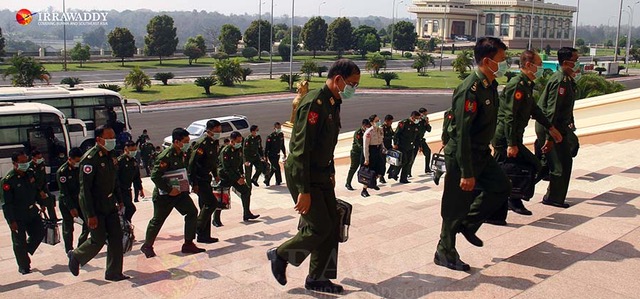Monday (March 16)
All the 15 proposed amendments voted on in the Union Parliament ended in failure. The proposals included amendments, additions and repeals to the Constitution that are covered by Article 436(b) and therefore require the support of more than 75 percent of lawmakers to pass, but do not require a referendum.
Among the other proposals rejected were a motion to remove the defense and security committees from the Lower House, Upper House and state and regional legislatures, and a motion to bar anyone who has been permitted to use state-owned land or property from being elected as a lawmaker, and a proposal to give the president the full power to grant amnesties.
Tuesday (March 17)
The Union Parliament voted down the military and Union Solidarity and Development Party (USDP) lawmakers’ joint proposal to have state and regional chief ministers elected by their legislatures rather than appointed by the president.
Another proposal submitted by the military-appointed lawmakers to bar anyone who has a foreign citizen in their immediate family from becoming a Union minister or chief minister — an expansion of Article 59(f)’s restriction imposed on the presidency— was also rejected.
Military lawmaker Brigadier General Maung Maung accused the National League for Democracy (NLD) of a smear campaign targeting the military after the failure of charter reform. Another military lawmaker, Lieutenant-Colonel Myo Htet Win, accused the NLD of driving a wedge between the people and the military.
Wednesday (March 18)
Among 19 proposed constitutional amendments put to a vote, a single proposal was approved: to remove language deemed unnecessary from the charter’s provision on appointing regional and state ministers.
The passage that was approved for removal stated that a regional or state minister could be appointed from among elected representatives or from among those who are not elected representatives, assuming they meet the other requirements.
Thursday (March 19)
The Union Parliament voted down the NLD’s proposal regarding the representative recall, meaning the voters in a constituency can initiate a recall against their lawmaker if a minimum of 1 percent of voters agree to do so. The NLD proposed that the petition should be signed by at least 20 percent of original voters to initiate a recall.
The Union Parliament’s speaker rejected a call to accept USDP lawmaker U Thaung Ay’s urgent proposal which urged the Union government to design emergency plans for a possible COVID-19 outbreak in Myanmar.
The chairman of the Lower House Health and Sports Development Committee, Dr. San Shwe Win, said an urgent proposal was unnecessary because the Union government has already formed a national-level committee to address the issue, and the Ministry of Health and Sports has also been updating its guidance on the outbreak in real time.
Friday (March 20)
Fourteen proposed amendments put to a vote on the final day of the charter amendment voting ended in failure.
Among the proposals rejected were a proposal to change the current national flag and proposal to remove the entire Chapter 14 “Transitory Provisions” which is about the power transfer from the military government of the State Peace and Development Council to an elected government under the 2008 Constitution.

















